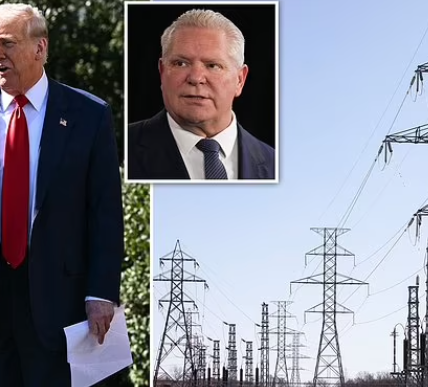Owners of rental homes across the country face huge bills to meet Labour’s strict new eco targets… meaning even Keir Starmer will be hit with £28,000 home improvements charge_Nhy
Labour‘s plans to force owners of rental properties across Britain to comply with strict new eco targets has left Sir Keir Starmer facing a bill of up to £28,000 for home improvements.
Since moving into his grace-and-favour apartment in Downing Street, the Prime Minister has been letting his £2 million family home – a four-bedroom townhouse in North London, on which he no longer pays a mortgage.
But the property’s energy efficiency rating falls below Labour’s new requirements for landlords, meaning that he will have to spend a five-figure sum on renovations over the next five years to keep renting it out legally.
Under plans announced by Energy Secretary Ed Miliband, all rented properties in England must have an Energy Performance Certificate (EPC) of C or above by 2030.
Around 2.9 million buildings are expected to be upgraded to meet the C rating at a collective cost of £23.4 billion or £8,074 per property, according to analysis by property website Rightmove. Currently they only need to have a rating of E.
But many older properties will never be able to meet the new minimum standard, prompting fears that landlords will sell up, potentially squeezing the market and pushing up rent for tenants.
The Mail on Sunday can reveal that Sir Keir’s house, which he began renting out in September, has received a D rating, which can only be improved if he pays for expensive eco upgrades, such as wall insulation.
The total cost for this, as advised by the EPC, which gives estimates for improvements, is between £13,035 and £28,235 – and failure to make the changes risks a fine of up to £30,000.

Keir Starmer and his wife Victoria. Their home’s energy efficiency rating falls below Labour’s new requirements, meaning that he will have to spend a five-figure sum on renovations over the next five years to keep renting it out legally

Tthe Prime Minister has been letting his £2 million family home – a four-bedroom townhouse in North London (pictured), on which he no longer pays a mortgage

The Mail on Sunday can reveal that Sir Keir’s house, which he began renting out in September, has received a D rating, which can only be improved if he pays for expensive eco upgrades, such as wall insulation
Landlords who do not comply with EPC rules can be fined a minimum of £10,000 for non-compliance of more than three months.
The Prime Minister has not declared his rental income on the Register of Members’ Financial Interests but The Mail on Sunday understands that is because it is under the £10,000-a-year threshold and he is renting it out to a family member.
And the Prime Minister is not the only landlord on Labour’s frontbench who faces being banned from renting out their properties.
Rachel Reeves, who started letting her four-bedroom South London home when she moved into 11 Downing Street, would need to spend between £8,400 and £13,050 to meet the new rules.
Her Dulwich house has an EPC rating of D and requires loft and floor insulation, as well as solar water heating to boost its score.
The Chancellor currently gets around £3,200 a month for the home that she and her husband Nicholas Joicey, a senior civil servant, bought for £599,950 in 2012, according to The Telegraph.
Foreign Secretary David Lammy, who rents out a property in North London, also has a D rating. His is D55 – the lowest number before being in the E category – and only has the potential to become D65, not a C.
This may mean he will be unable to rent it out by 2030.

Rachel Reeves (pictured), who started letting her four-bedroom South London home when she moved into 11 Downing Street, would need to spend between £8,400 and £13,050 to meet the new rules

Under plans announced by Energy Secretary Ed Miliband (pictured), all rented properties in England must have an Energy Performance Certificate (EPC) of C or above by 2030
Likewise Ian Murray, the Secretary of State for Scotland, only has a rating of F on his rented flat in Edinburgh which could, at best, reach an E with upgrades.
In Scotland, any property marketed for private rent as of 2025 must have an EPC rating of C or above.
Earlier this year, The National newspaper reported that Mr Murray was earning thousands from letting the ‘bright and very spacious’ property on Airbnb.
Housing minister Rushanara Ali rents out two flats in East London, both of which have D ratings. The estimated costs for upgrading both are between £8,850 and £21,500.
Labour has pledged to invest an additional £6.6 billion in its warm homes plan this Parliament to make grants and low interest loans available for insulation, as well as solar panels, batteries and low carbon heating in a bid to cut bills.
As many as 300,000 homes will be upgraded next year using £3.2 billion of the funding.
A spokesman for the National Residential Landlords Association has said: ‘Upgrading to an EPC C will require a higher level of investment – and the ability of landlords to fund this will vary, particularly given the regional variability in their options to leverage finance from their property values.
‘Some landlords may have to increase rents to match increased maintenance costs.’

Ian Murray (pictured), the Secretary of State for Scotland, only has a rating of F on his rented flat in Edinburgh which could, at best, reach an E with upgrades
He added: ‘The costs of these changes vary greatly on the type of property. It is also important to take into consideration how landlords are impacted by the region their properties are based in.
‘Our research in 2021 found that in some local authority areas of the North and Midlands, the estimated costs of improving home energy are around 25 per cent of property values.
‘By contrast, in affluent parts of London and the South East the cost of retrofitting with heat pumps represents less than 2 per cent of overall property value.’
A Government spokesman said yesterday: ‘This Government has pledged to improve energy efficiency in British homes – cutting bills, helping to lift millions out of fuel poverty and keeping households warm.’




